I've undertaken a lot this summer. The largest being a month long commitment to writing. I was graciously asked to apply to, and then accepted, into North Star of Texas Writing Project's Summer Institute. My co-ninja, Kelly, has been a part of NSTWP for years now and she has been after me for at least as long to accept writing as "good and not evil". I was positive that it was just not part of who I was. But it happened, she was finally able to brainwash me into feeling the need to go and become a part of this Writing Project.
I went.
Begrudgingly.
Dragging my hypothetical feet like an insolent brat.
I complained most of the first week, or maybe it was two weeks.
So don't tell her that I am actually enjoying it. I knew I would learn a lot, but I never in my wildest ideas thought I would end up thinking like a writer. I am the READING NINJA for Pete's sake!
But alas, I have been cursed with now having the brain of a writer. I can't see something odd or unusual and not think "Oh! I should write this down!" or "That comment would make a great blog post." (I am looking forward to writing about my experience this morning while at the hair salon!) Most of those will end up on my personal blog, due to my "adult" sense of humor. No matter; the fact is, it now seems that I must keep track of everything because I might want to write about it someday. I am constantly writing intros and hooks in my head, seeing how it sounds, for days or weeks before I get it on paper.
I've been listening to David Sedaris's newest book on my iPhone as I drive the hour and a half north to get to these classes. He writes little personal vignettes about things he's seen or noticed. Most of them are small, but then he connects them to another event in his childhood or to when he was a young adult. I think he's hilarious, and as I was writing the other day I noticed I was modeling my writing after his. My own mentor text. Hmmm - who knew I'd someday think like a writer? Ok - who besides Kelly.
Showing posts with label North Star of Texas Writing Project. Show all posts
Showing posts with label North Star of Texas Writing Project. Show all posts
June 27, 2014
November 21, 2013
5 Reasons To Use Evernote When Conferring With Students - NCTE13
Well, friends, with Evernote you can....
1. Organize your thoughts with purposeful tags: I don't know about you, but helping students grow their writing skill is not the only thing I have going on in my classroom -- or my life. Don't get me wrong, I love speaking with young writers about their work. But keeping everything straight in my head is not easy. I need to be able to quickly assess who I need to conference with and what piece they were working on last. Evernote has definitely come through to help.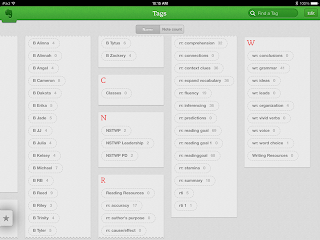.PNG) |
| Some of the Reading and Writing tags I used last year. |
2. Use notebooks to categorize large groups of notes: I work with more than one group of students, especially now that I am in the library. Instead of having a huge pile of notes all jumbled together, I've found that it helps me to create a tag for each student that matches the notebook I keep all their data in. This way, I can look at the whole group as well. Whether it is a writing club, classroom, tutorial group, or even a teacher writing group -- everything has a place!
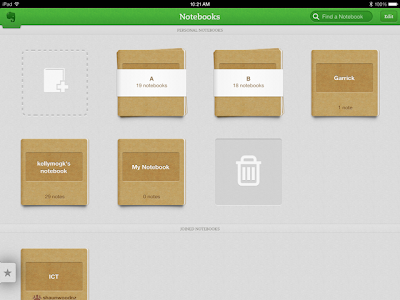 |
| Group A and B are classroom notebooks |
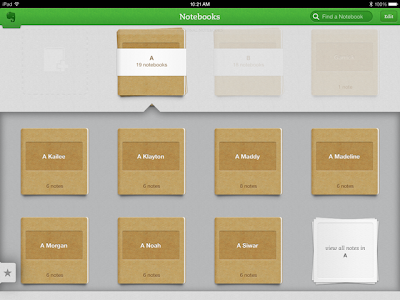 |
| Inside each notebook "stack" is a notebook for each student with the same tag. |
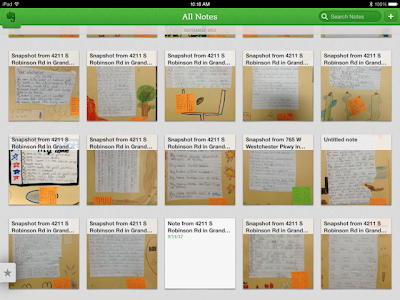 |
| Student work showing my sticky note feedback. |
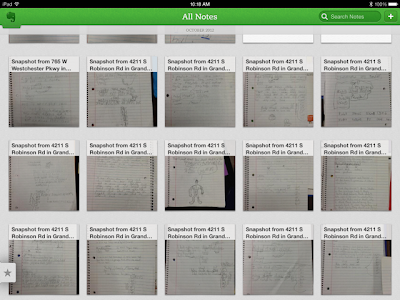 |
| Photos of response to reading of The One and Only Ivan |
 |
| Russ Goerend's site was the first I used to start my Evernote journey! |
 |
| The Together Teacher on Evernote as a conferring tool |
November 20, 2013
Conferring with Inquiry in Mind - #NCTE13
I love the way my peers in The North Star of Texas Writing Project challenge me to think deeply about the decisions I make when working with young writers. Here is the thinking I've been sifting through about conferencing with students:
 |
What?
I believe student conferences are the heart of writing workshop, but how do I guide conversations to encourage student growth without doing the work for them or squashing the young writer’s voice or desire to write? There is a Don Murray quote in Write Beside Them that embodies my goals when conferencing with a writer: “you should always leave a conference excited to get back to the writing.” I want to create contagious enthusiasm in an environment that encourages writers to take joy in the risk of playing boldly with their craft.
So what?
Lucy Calkins said, “Helping [students] take themselves seriously is crucial for them as writers and as maturing human beings.” I believe daily modeling through mentor texts helps students identify what works in a piece of writing, which is essential to scaffolding their ability to discover both what works and does not work in their own writing. Mentor texts and conferencing work hand in hand. I also know a student’s decision to share their writing heart with me is dependent on how I treat them -- as a person and as a writer. Don Murray said, “I must create a climate in the writing conference in which students can hear what they have to say so they can learn to listen to their own writing.” I must be purposeful in my planning and my words each time I work with a writer.
Now what?
I invite writers to share their work with me, and sometimes offer to read back their writing to them. This seems to help them hear their writing as their audience will receive it, and gives them the opportunity to write down what they notice about their own work. I’m learning to wait on writers when they are contemplating what their writing needs. My silence gives them space to think, and my “I notice” and “I wonder” statements help them look for their own answers, building their writing confidence. Research shows that writers grow best from receiving feedback, not evaluation. In fact, in The Essential Don Murray, he states it so eloquently :
"How do you motivate your student to pass through this process, perhaps even pass through it again and again on the same piece of writing?
First, by shutting up. When you are talking, he isn't writing."So my job during a writing conference is not to correct or change their work, but to listen and guide through gentle feedback and the silence that allows self reflection. I praise what has worked, and invite them to experiment with these techniques in other ways.
Takeaway:
As a writing partner, it’s my job to be prepared when we sit down together. In this way, I show respect for the writer and their work. This means knowing where my learners are in their writing journey. I need strong organization and notes on each writer. I have found Evernote to be indispensable tool helping me efficiently organize my conference notes. By creating folders for each student, I can tag their work and include photos, my own conference notes, and audio files on the work we do together. This also allows me to keep a digital writing portfolio on each writer to share with parents, in data meetings, and for the student to reflect on their work throughout the year.
Labels:
choice,
choice words,
conferencing,
conferring,
conversations,
dialogue,
manifesto,
mentortext,
NCTE13,
North Star of Texas Writing Project,
NSTWP,
NWP,
reflections,
student writing,
writing
November 16, 2013
The Art of Conversation - #NCTE13
Our students need a champion.
They come to us so often with voices screaming in their head, "I can't," after a lifetime of teachers and tests whispering try harder in their ears. And if you think a lifetime sounds like an exaggeration, consider the struggling readers and writers that have been trying harder since they were just four years old. When I first meet my young learners, they have been trying harder for half their lives, or more.
Young writers have a voice. They were born with it. Brilliant, beautiful, true words that sing of who they have been, who they are, and who they want to be. Somehow along the way - struggling through family issues, peer pressure, test trauma - they become detached from what is meant to be natural.
Young writers have a voice. They were born with it. Brilliant, beautiful, true words that sing of who they have been, who they are, and who they want to be. Somehow along the way - struggling through family issues, peer pressure, test trauma - they become detached from what is meant to be natural.
After all, we've been telling stories since time began.
I say to my students, my young readers and writers: "It's your story. Who better than you to tell it? Who better than you to know the perfect words to shout your story from the mountains? Who better than you to share your genius with the world?"
They already have the story. It's our job to light up the path, to put the tools in their hands and cheer them on, to be there when they need reassurance, saying, "Now, go forward. Be brave. You've had it in you all along."
| Photo taken during a North Star of Texas Writing Project Teacher Training session |
When we step into a classroom, sit alongside our students, and invite them to share their writing, we have important choices to make. We can become either their greatest champion or an unknowing saboteur of their voice and desire to learn.
When I sit down with struggling writers to discuss a piece of writing, I first ask them to read the piece to me. Often I find that they tell me the idea of the story instead of reading the actual words on the page. When this happens, I ask if they mind if I read it to them, exactly as it is written. I suggest that they listen to hear if the story I read is what they feel like they have written. I ask them to listen like a reader, noticing what they love and what doesn't work for them. They've done this before with mentor texts I've shared in class, so adapting this skill to their own writing isn't difficult.
Almost always, they are magnificent at discovering exactly the things I noticed when I first listened to them read. They are the drivers in these conferences. I am merely there to help navigate the path. We go over their list, and I praise both what they have done well as a writer and as a reader -- their ability to notice is a key to improvement. When I help students hear how their audience will experience their story, their perception of their work changes, and they are open to experimenting with revision. They want their message understood with the same passion and enthusiasm they feel for it, so the work of revision becomes an authentic means to reach their goal.
Although I feel there is no magic formula for the perfect conference -- conferring with students, much like writing, is an art -- my conversations with writers do have some common elements. Here you will see my inspiration comes from the teachings of Donald Murray, Lucy Calkins, Donald Graves, Penny Kittle, Mark Overmeyer, Ruth Ayers, and countless other masters of writing instruction, so I've tried to share some links that point to their work, along with my thoughts on what makes a successful writing conference:
Almost always, they are magnificent at discovering exactly the things I noticed when I first listened to them read. They are the drivers in these conferences. I am merely there to help navigate the path. We go over their list, and I praise both what they have done well as a writer and as a reader -- their ability to notice is a key to improvement. When I help students hear how their audience will experience their story, their perception of their work changes, and they are open to experimenting with revision. They want their message understood with the same passion and enthusiasm they feel for it, so the work of revision becomes an authentic means to reach their goal.
 |
| Conferring with young writer during a Saturday Writing Camp |
- Community: we write and share as a group every day, playing with words and celebrating one another for having the bravery simply to explore our craft.
- Listen - what is the message you are trying to share with your audience? What is the truest sense of the story you want to tell?
- Notice - elements in the writing that work, and places that make the reader stumble.
- Wonder - guide the process, wherever the writer is at, asking questions like, "I wonder what this piece would be like if..."
- Wait - give writers time to think, don't jump in to solve their problems for them, choose words sparingly - don't be afraid of silence.
But mostly, I follow my heart. I speak with my young writers the same way I would want anyone to speak with me about my writing: gently, with great compassion, and a desire to help. In this way, I am able to help them build trust. Not simply trust in me as a teacher -- that isn't enough to sustain their growth as writers. These conversations build the trust they have in their own abilities. Each word I choose is specific to the writer and focused on what they do well. By modeling these conversations daily through our conferences, they are able to read closely for themselves when working alone or when revising with a peer. Our classroom becomes a space open to respectful conversations focused on growing every writer to their full potential.
Labels:
#nerdywriterclub,
choice words,
conferencing,
conferring,
conversations,
dialogue,
mentortext,
NCTE13,
North Star of Texas Writing Project,
NSTWP,
NWP,
reflections,
student writing,
writing
Subscribe to:
Posts (Atom)


